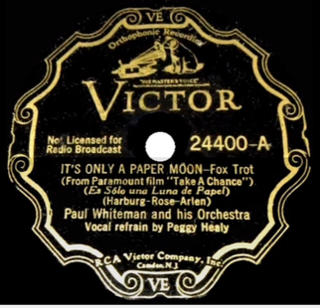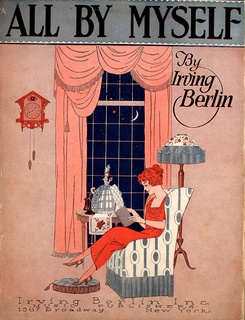"Papa Loves Mambo" is a popular song written by Al Hoffman, Dick Manning, and Bix Reichner and published in 1954.
"Red Sails in the Sunset" is a popular song. Published in 1935, its music was written by Hugh Williams with lyrics by prolific songwriter Jimmy Kennedy. The song was inspired by the "red sails" of Kitty of Coleraine, a yacht Kennedy often saw off the northern coast of Northern Ireland and by his adopted town Portstewart, a seaside resort in County Londonderry.
"The Christmas Song" is a classic Christmas song written in 1945 by Robert Wells and Mel Tormé.
"On the Street Where You Live" is a song with music by Frederick Loewe and lyrics by Alan Jay Lerner from the 1956 Broadway musical My Fair Lady. It is sung in the musical by the character Freddy Eynsford-Hill, who was portrayed by John Michael King in the original production. In the 1964 film version, it was sung by Bill Shirley, dubbing for actor Jeremy Brett.
"Do Nothing till You Hear from Me" is a song with music by Duke Ellington and lyrics by Bob Russell. It originated as a 1940 instrumental that was designed to highlight the playing of Ellington's lead trumpeter, Cootie Williams. Russell's words were added later. In 1944, Ellington's own recording of the song was a number one hit R&B chart for eight non-consecutive weeks and number six on the pop chart.
"Too Marvelous for Words" is a popular song written in 1937. Johnny Mercer wrote the lyrics for music composed by Richard Whiting. It was introduced by Wini Shaw and Ross Alexander in the 1937 Warner Brothers film Ready, Willing and Able, as well as used for a production number in a musical revue on Broadway. The song has become a pop and jazz standard and has been recorded by many artists.

"It's Only a Paper Moon" is a popular song published in 1933 with music by Harold Arlen and lyrics by Yip Harburg and Billy Rose.
"I'll Remember April" is a popular song and jazz standard about a romantic relationship ending. The lyric uses the seasons of the year metaphorically to illustrate the growth and death of a romance. The lyric also uses the ideas of the hours in a day and the flames of a fire to illustrate a relationship growing stronger and subsequently losing strength. The song has been described as one which makes use of nostalgia, with music written in 1941 by Gene de Paul, and lyrics by Patricia Johnston and Don Raye. It made its debut in the 1942 Abbott and Costello comedy Ride 'Em Cowboy, being sung by Dick Foran.
"Somebody Loves Me" is a popular song, with music written by George Gershwin, and lyrics by Ballard MacDonald and Buddy DeSylva. The song was published in 1924 and featured in George White's Scandals of 1924.
"Breezin' Along with the Breeze" is a popular song.

"Nobody's Sweetheart", also known as "Nobody's Sweetheart Now" and "You're Nobody's Sweetheart Now", is a popular song, written in 1924, with music by Billy Meyers and Elmer Schoebel, and lyrics by Gus Kahn and Ernie Erdman. The song is a jazz and pop standard.
"Oh, How I Miss You Tonight" is a popular song, published in 1925, written by Benny Davis, Joe Burke, and Mark Fisher. Popular recordings of the song in 1925 were by Ben Selvin, Benson Orchestra of Chicago, Lewis James and Irving Kaufman.
"Like Someone in Love" is a popular song composed in 1944 by Jimmy Van Heusen, with lyrics by Johnny Burke. It was written for the 1944 film, Belle of the Yukon, where it was sung by Dinah Shore. It was a hit for Bing Crosby in March 1945, reaching number 15, and has since become a jazz standard.

"All by Myself" is a popular song written by Irving Berlin, published in 1921.
"Blame It on My Youth" is a jazz standard written by Oscar Levant (music) and Edward Heyman (lyrics) in 1934.
"For You" is a song written by Joe Burke and Al Dubin in 1930. It was introduced in the Mack Sennett short Billboard Girl (1931) when it was sung by Bing Crosby.

"Poinciana" is a song by Nat Simon with lyrics by Buddy Bernier written in 1936.
Kathleen G. "Kay" Twomey was an American songwriter and music arranger. Twomey co-wrote Serenade of the Bells, which reached the Billboard magazine Best Seller chart on November 7, 1947 and lasted 16 weeks on the chart, peaking at #3, and in a separate recording reached the Billboard's Best Seller chart on December 26, 1947 at #13. She also co-wrote Wooden Heart, best known for its use in the 1960 Elvis Presley film G.I. Blues. A cover version by Joe Dowell made it to number one in the US charts at the end of August 1961. Dowell's version also spent three weeks at number one on the Easy Listening chart.
"Coquette" is a 1928 fox trot jazz standard. It was composed by Johnny Green and Carmen Lombardo, with lyrics by Gus Kahn. Guy Lombardo had great success with the song in 1928.

Unforgettable – A Musical Tribute to Nat King Cole is a soundtrack album released in the UK in 1983 by the CBS Records division of Columbia in conjunction with the broadcast of American pop singer Johnny Mathis's BBC television concert special of the same name that featured Cole's daughter Natalie. The front of the original album jacket credits the concert performers as "Johnny Mathis and Natalie Cole", whereas the CD booklet reads, "Johnny Mathis with special guest Natalie Cole".




